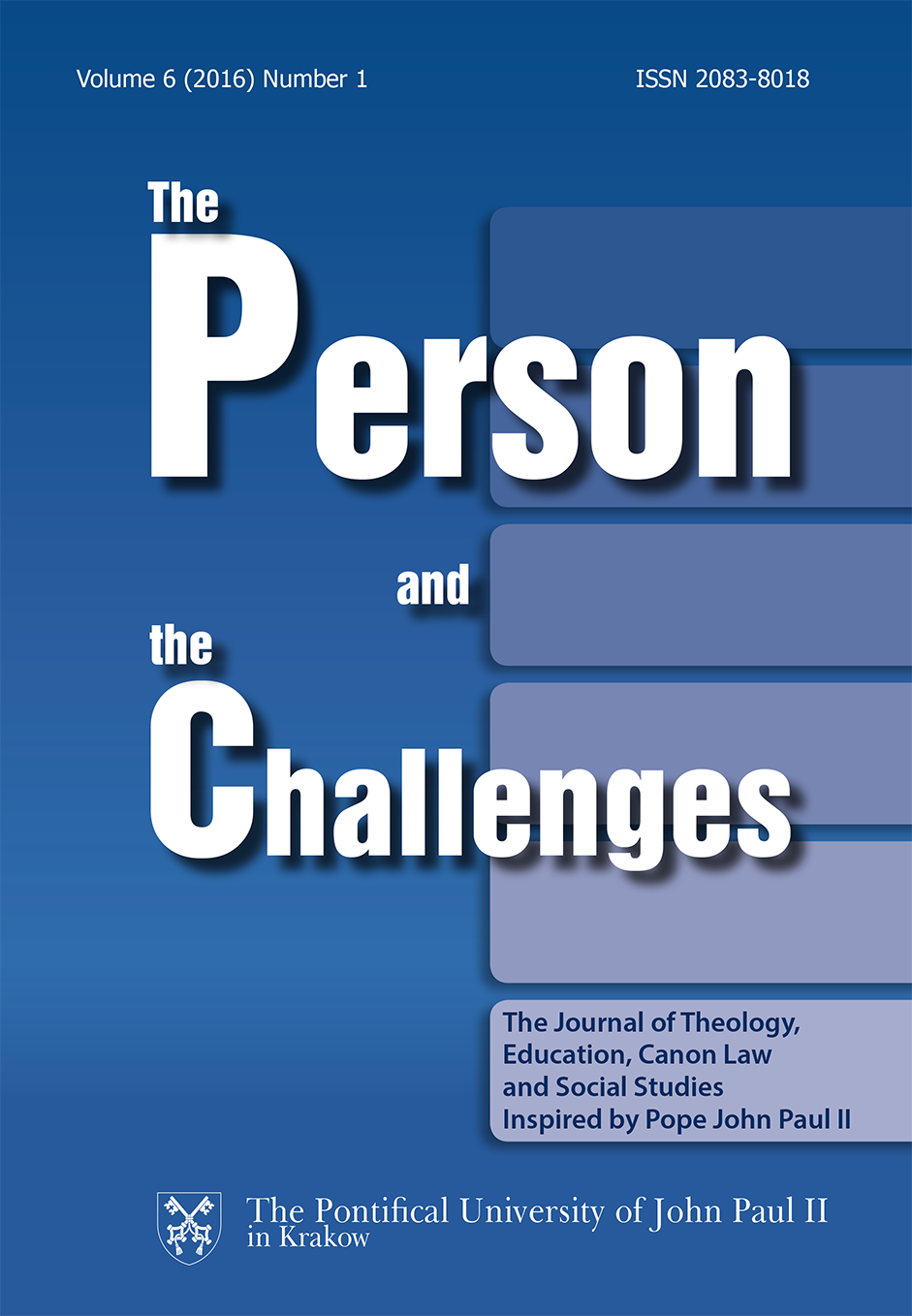Die Werteerziehung im Lehrwerk Johannes Pauls II.
DOI:
https://doi.org/10.15633/pch.1654Słowa kluczowe:
Upbringing, education, values, religion, John Paul IIAbstrakt
An in‑depth analysis of writings of John Paul II leads to a conclusion that the Pope cared for upbringing that would foster to values. He clearly indicated that the person is to be viewed as the foundation of the process of upbringing and also stressed the significance of upbringing towards life in the family, nation and Church. The author of this article accounts for and presents the problem of upbringing towards values, which is interpreted from the teachings of John Paul II. First, the author indicates the complementary character of education, religion and faith, then they are oriented towards the world of values and the Christian hierarchization of these values.Bibliografia
Benning A., Ethik der Erziehung, Zürich 1992.
Błasiak A., Młodzież – świat wartości, Kraków 2002.
Bobko A., Poszukiwanie prawdy o człowieku, „Znak” 3 (2001), S. 57.
Borowski H., Wartość jako przeżycie, Lublin 1992.
Darowski R., Filozofia człowieka, Kraków 1992.
Education and Creativity, Hrsg. E. Osewska, Warszawa 2014.
Fromm E., Zdrowe społeczeństwo, Warszawa 1996.
Heitger M., Braucht Bildung Religion – braucht Religion Bildung?, in: Bildung, Glaube und Wissen, Hrsg. G. Brinek, G. Schaufler, Innsbruck – Wien 1991, S. 108–109.
Hejnicka – Bezwińska T., O zmianach w edukacji. Konteksty, zagrożenia i możliwości, Bydgoszcz 2000.
Kowalczyk S., Teoria poznania, Sandomierz 1997.
Kowalski J., Etyka katolicka wobec neoliberalizmu, „Polonia Sacra” 5 (1999), S. 188–189.
Łata J. A., Odpowiadająca teologia Paula Tillicha, Oleśnica 1995.
Mały słownik etyczny, Hrsg. S. Jedynak, Bydgoszcz 1994.
Marczuk S., Problemy klasyfikacji wartości, „Studia Filozoficzne” 6 (259) (1987).
Mariański J., Kryzys moralny czy transformacja wartości. Studium socjologiczne, Lublin 2001.
Mariański J., Moralność w procesie przemian. Szkice socjologiczne, Warszawa 1990.
Milan G., L`autorita e liberta nell educazione dell adolescente, „Nuova Umanita” (1989) Nr. 64–65, S. 109–124.
Nauki o rodzinie w służbie rodziny, Hrsg. J. Stala, Kraków 2014.
Nowak L., Jednostka a system społeczny, in: Podmiotowość: możliwość, rzeczywistość, konieczność, Hrsg. P. Buczkowski, R. Cichocki, Poznań 1989, S. 71–108.
Osewska E., Education and Internet Challenges, in: Education and Creativity, Hrsg. E. Osewska, Warszawa 2014, S. 43–56.
Osewska E., The Current Situation of Education and Continuing Professional Development of RE Teachers in Poland in the Context of the Social Challenges, “The Person and the Challenges” 2 (2012) Nr. 2, S. 123–131.
Osewska E., To Educate in a Diversified Europe, „The Person and the Challenges“ 1 (2011) Nr. 1, S. 71–88.
Popielisk K., Człowiek: egzystencja podmiotowo‑osobowa, in: Człowiek – wartości – sens. Studia Z psychologii egzystencji, Hrsg. K. Popielski, Lublin 1996, S. 25–48.
Religious Education / Catechesis in the Family. A European Perspective, Hrsg. E. Osewska, J. Stala, Warszawa 2010.
Rudzińska K., Filozofia wartości J. Tischnera, „Studia filozoficzne” 4 (1988), S. 32.
Sareło Z., Postmodernistyczny styl myślenia i życia, in: Postmodernizm. Wyzwanie dla chrześcijaństwa, Poznań 1995.
Stala J., Der Mensch als Person: Die bestimmende Grundlage für Johannes Paul II. in seinem Bild von der Familie, „The Person and the Challenges” 2 (2012) Nr. 2, S. 41–59.
Stala J., Lehrpläne und Schulbücher für den Religionsunterricht an den Staatlichen Grundschulen in Polen, „Bogoslovni vestnik“ 70 (2010) Nr. 3, S. 405–414.
Stala J., Osewska E., Anders erziehen in Polen. Der Erziehungs- und Bildungsbegriff im Kontext eines sich ständig verändernden Europas des XXI. Jahrhunderts, Tarnów 2009.
Stala J., Towards Religious Education in the Family in the 21st Century, in: The Contemporary Family: Local and European Perspectives, Hrsg. E. Osewska, J. Stala, Kraków 2015, S. 309–318.
Stanosz B., Liberalna a chrześcijańska filozofia wartości, in: Z punktu widzenia humanizmu, Warszawa 1995.
Stróżowski W., Istnienie i wartość, Kraków 1981.
Stróżowski W., W kręgu wartości, Kraków 1992.
Styczeń T., Człowiek i jego prawa w nauczaniu Jana Pawła II, czyli chrześcijanin wobec wartości ludzkich dziś (Część pierwsza), „Wychowawca” (1993) Nr. 2, S. 22–23.
Styczeń T., Usensownić swe działanie to dla człowieka być, in: Człowiek – pytanie otwarte, Hrsg. K. Popielski, Lublin 1987, S. 177–180.
Szostek A., Wokół godności, prawdy i miłości, Lublin 1998.
Śnieżyński M., Wartości chrześcijańskie – wartości uniwersalne, „Wychowawca” (1993) Nr. 6, S. 9.
Tillich P., Liebe Macht Gerechtigkeit, Walter de Gruyter – Berlin – New York 1991.
Tillich P., Religiöse Reden, Walter de Gruyter – Berlin – New York 1987.
Tillich P., Rzeczywistość Chrystusa. Nowy Byt, Oleśnica 1996.
Witkowski L., Edukacja wobec sporów o (po) nowoczesność, Warszawa 1998.
Wojtyła K., Elementarz etyczny, Lublin 1983.
Żuk‑Łapinska L., Problem konfliktu wartości, „Studia Filozoficzne” 6 (259) (1987), S. 73.
Życiński J., Medytacje sokratejskie, Lublin 1991.
Pobrania
Opublikowane
Numer
Dział
Licencja
Prawa autorskie (c) 2016 Józef Stala

Utwór dostępny jest na licencji Creative Commons Uznanie autorstwa 4.0 Międzynarodowe.
Autorzy publikujący w czasopiśmie udzielają jego wydawcy zgody o następującej treści:
- Autor zachowuje autorskie prawa majątkowe do utworu, a jednocześnie udziela wydawcy czasopisma zgody na jego pierwszą publikację w wersji drukowanej i wersji online na licencji Creative Commons Uznanie autorstwa 4.0 Międzynarodowe oraz zgody na wykonywanie opracowań, w tym przekładów.
- Autor ma możliwość udzielania zgody niewyłącznej na opublikowanie utworu w wersji, która ukazała się w czasopiśmie (np. zamieszczenia go w repozytorium instytucjonalnym lub opublikowania w książce), wraz z informacją o jego pierwszej publikacji w czasopiśmie.
- Autor może umieścić swój utwór online (np. w repozytorium instytucjonalnym lub na swojej stronie internetowej) jeszcze przed zgłoszeniem utworu do czasopisma.

